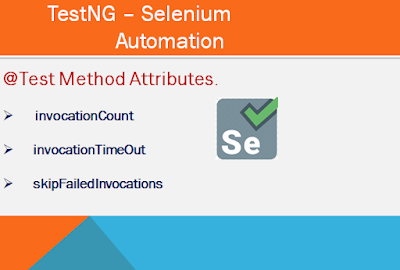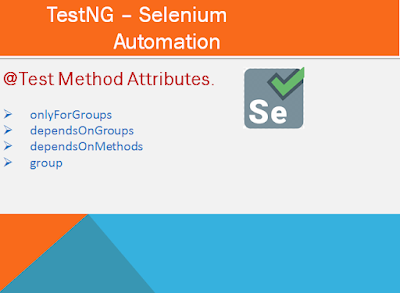How to use "invocationCount", "invocationTimeOut" and "skipfailedInvocations" Attributes?
invocationCount Attribute
In below example, iteration count is mentioned as 3, hence single method will execute 3 time.
Java Code-
public class Testing_InvocationCount {
@Test(invocationCount= 3)
public void testNG1()
{
String methodName = new Object(){}.getClass().getEnclosingMethod().getName();
System.out.println("Method name is :"+methodName);
}
@Test
public void testNG2()
{
String methodName = new Object(){}.getClass().getEnclosingMethod().getName();
System.out.println("Method name is :"+methodName);
}
}
Output-
[RemoteTestNG] detected TestNG version 7.4.0
Method name is :testNG1
Method name is :testNG1
Method name is :testNG1
Method name is :testNG2
PASSED: testNG1
PASSED: testNG1
PASSED: testNG1
PASSED: testNG2
===============================================
Default test
Tests run: 2, Failures: 0, Skips: 0
===============================================
===============================================
Default suite
Total tests run: 4, Passes: 4, Failures: 0, Skips: 0
===============================================
Related topic-
invocationTimeOut- Attribute
For Example, if invocationTimeOut is set 30 seconds and invocationCount is set to 10 times, then this method should complete all 10 invocations within 30 seconds; otherwise, the test will be marked as a fail.
This attribute will be ignored if the invocationCount is not specified on this method
Java Code-
public class Testing_invocationTimeOut {
@Test(invocationCount = 3,invocationTimeOut=1)
public void testNG1() throws InterruptedException
{
String methodName = new Object(){}.getClass().getEnclosingMethod().getName();
System.out.println("Method name is :"+methodName);
}
}
Outcome-
[RemoteTestNG] detected TestNG version 7.4.0
Method name is :testNG1
Method name is :testNG1
Method name is :testNG1
FAILED: testNG1
org.testng.internal.thread.ThreadTimeoutException: Method org.Testngpro.Testing_invocationTimeOut.testNG1() didn't finish within the time-out 1
.
.
===============================================
Default test
Tests run: 1, Failures: 1, Skips: 0
===============================================
===============================================
Default suite
Total tests run: 1, Passes: 0, Failures: 1, Skips: 0
===============================================
Related topic-
skipfailedInvocations Attribute
This method will be ignored if invocationTimeOut is specified in the @Test annotation.
In normal sceanrio, if we don’t use skipfailedInvocations attribute then it will show fail count as per the iteration mentioned in invocation count.
Java Code-
public class Testing_skipFailedInvocations {
@Test(invocationCount = 7,skipFailedInvocations=true)
public void testNG1() throws InterruptedException
{
fail("This method is failed");
String methodName = new Object(){}.getClass().getEnclosingMethod().getName();
System.out.println("Method name is :"+methodName);
}
}
Outcome-
[RemoteTestNG] detected TestNG version 7.4.0
FAILED: testNG1
java.lang.AssertionError: This method is failed
===============================================
Default test
Tests run: 1, Failures: 1, Skips: 0
===============================================
===============================================
Default suite
Total tests run: 1, Passes: 0, Failures: 1, Skips: 0
===============================================



No comments:
Post a Comment